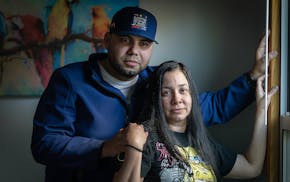Life for Ethan Glynn and his family changed in an instant when he didn't get up after making a tackle in his first game on the ninth-grade football team in 2022.
By the time his father, Corey Glynn, got to him, Ethan couldn't feel his arms and legs, Corey said in an interview. Ethan would spend the next few months in the hospital. At first, his family didn't know if he'd come off a ventilator.
He remains paralyzed from the shoulders down.
After Ethan's injury, Corey found out his son wasn't covered by the Minnesota State High School League's insurance policy. Their family would have to cover the costs of a powered wheelchair, van, home modifications, physical therapy and Ethan's other needs.
"Ethan wore the same school colors, played with the same heart and represented the very same school as the JV and varsity," Ethan's mother, Cassidy Durkin, told a Minnesota Senate committee last week, "yet he was denied the same protection as the other players."
That left their family "not only disappointed but scrambling," Corey said.
The wheelchair and van alone cost a combined $125,000, Corey said. He wasn't sure what Ethan's care cost in total.
Glynn and Durkin are asking the Legislature to require that the Minnesota State High School League cover ninth-grade athletes and increase its coverage limits. They spoke to the Minnesota Senate Education Committee along with Mike and Leslie Jablonski, whose son Jack was paralyzed in a high school hockey game in 2011.
Jack Jablonski played on the junior varsity and varsity teams, meaning he was covered by the league's insurance policy. At the time of Jack Jablonski's injury, the league carried a $2 million catastrophic injury policy. Mike Jablonski said the insurance plan says it covers vans, remodeling and other expenses, but denies claims. It covers caretaking, but at age 29, Jack has already used the bulk of the policy funds because he requires round-the-clock care.
"It's an endless list of medical needs, supplies, medications, caregivers, therapy," Leslie Jablonski told the Senate committee. "These are not luxuries. These are necessities."
The Minnesota State High School League (MSHSL), which administers sports and extracurricular activities to member schools across the state, has since increased its policy to $3 million and extended it to ninth-grade athletes, the league told lawmakers in a committee hearing last week. Representatives for the MSHSL asked lawmakers not to pass the legislation, arguing it was unworkable.
The legislation would require the league to carry a $10 million policy and mandate that it continue to cover ninth-graders.
"We want to get this stuff in place before the next Ethan or Jack happens, because it will," Corey Glynn said. "It will eventually happen again."
School officials whose districts partner with the MSHSL for extracurriculars said the extra expense from mandating the larger insurance policies would be passed to districts.
"We believe we purchase the best policy available in the market with an appropriate amount of coverage," Renee Corneille, superintendent of St. Anthony-New Brighton School District, told the Senate committee.
Corneille also serves on the MSHSL board.
The legislation would also instruct the league to buy a policy that "prohibit(s) a denial of a claim for a medical item, treatment or service covered under the policy and recommended by the injured student's treating health care provider."
"We've talked to our broker, and that type of policy does not exist in the market" the league's lobbyist Roger Aronson told the Senate committee. "…I'm not exactly sure what would happen."
Aronson said the league had not calculated what it would cost to obtain a $10 million policy, but a $5 million policy would be another $125,000 each year. The policy it purchased when it extended coverage to ninth-grade teams cost more than $750,000, league representatives said.
The MSHSL did not return a request for comment.
Both Ethan Glynn and Jack Jablonski's injuries changed everything for them and their families.
Leslie Jablonski said the realization hit her when she first heard a doctor use the term quadriplegic.
"Then all of a sudden I knew," she told the Senate committee, "this isn't going to get any better. This is only going to get worse."
Mike Jablonski said Jack is living in California because his body can't regulate temperature as a result of his injury. He has a full-time caretaker, and Mike visits periodically to give Jack's caretaker a break.
It's been tough on their family, Mike said.
"I wouldn't wish it on my worst enemy," he said.
Since Ethan wasn't eligible for any insurance following his injury, Corey said, his family takes care of him. When he first came home from the hospital, he had lost a lot of weight, and Corey feared he would injure him when he moved him between his wheelchair and bed.
It changed the relationships in their family too, Corey said. Before the injury, Ethan and his brother, Parker Durkin, would roughhouse and play basketball together. Corey coached Ethan in baseball.
"We had to figure out a new way of doing things," he said, "but I think the biggest thing is we always had each other."
Corey said while Ethan was in the hospital, he kept thinking about how he couldn't fix it.
"I can fix anything up until now," he said he thought at the time. "This, I can't fix."
But Corey said Ethan decided one day to have a positive outlook about his injury and future.
"He says it all the time," Corey said. "He goes, 'I'm still the same Ethan. I just do things differently now.' And he said that at 15. I'm 50 and I wasn't thinking like that."
Sen. Scott Dibble, DFL-Minneapolis, sponsored the legislation. He said he respects that the league wants to make its own insurance decisions, but that its recent changes don't help Glynn's or Jablonski's families.
"A solution has to be found," Dibble said. "This is unacceptable and untenable."
To get Minnesota's latest political news in your inbox, sign up for the free Hot Dish newsletter.

Trump says US Steel will keep HQ in Pittsburgh in a sign he'll approve bid by Japan-based Nippon

Authorities, family identify man fatally shot by Coon Rapids police during reported domestic

Planned Parenthood North Central States to lay off 66 workers, restructure presence in Minnesota

Roper: Let's celebrate improvements to the local bus
